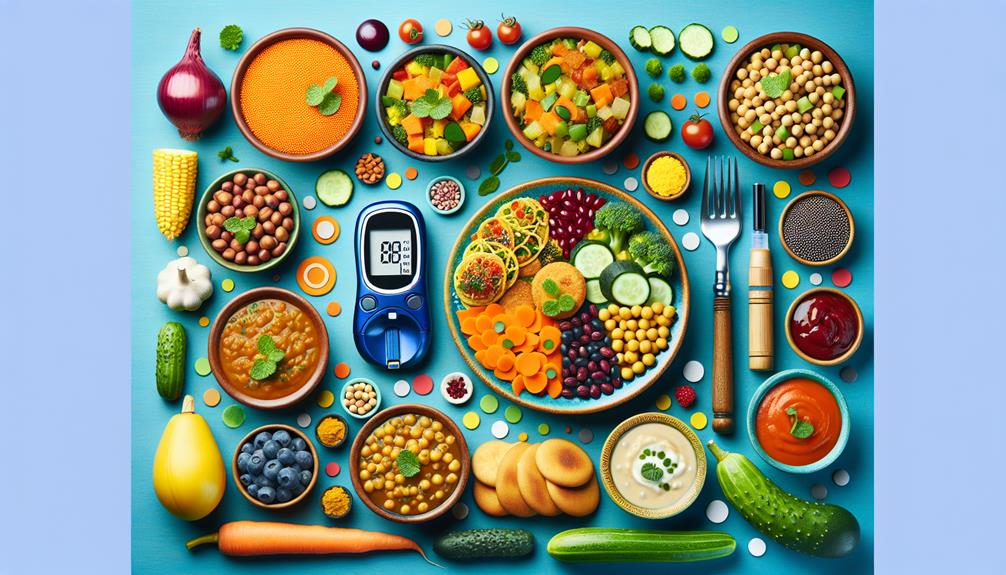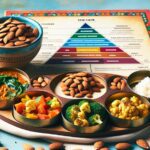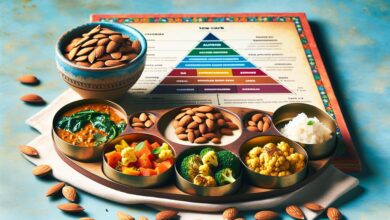In the realm of nutritional management for diabetes, the adoption of a vegan diet, particularly one infused with the rich tapestry of Indian cuisine, offers a compelling avenue for exploration. The 7-Day Vegan Indian Diet Plan for Diabetics is meticulously crafted to cater to the specific needs of individuals navigating the complexities of blood sugar regulation, while also honoring cultural food practices. This plant-based regimen is not merely a list of ingredients or recipes; it is an interwoven strategy that addresses the tenets of a diabetic-friendly diet—low in glycemic index, replete with fiber, and mindful of macro and micronutrient balance. As we consider the potential advantages such a diet could confer, from potential weight management to improved glycemic control, one might ponder the practicality and satisfaction that could emerge from this confluence of healthful eating and traditional flavors.
Key Takeaways
- Prioritize balanced intake of carbohydrates, proteins, and fats
- Include fresh fruits and vegetables for vitamins, minerals, and fiber
- Incorporate whole grains like brown rice and quinoa for sustained energy
- Regularly track dietary intake and blood glucose levels
Understanding Diabetes Nutrition
Navigating the complexities of diabetes nutrition, individuals must prioritize a balanced intake of carbohydrates, proteins, and fats to maintain optimal blood sugar levels and support overall health. A diabetes diet plan is not merely a prescriptive list of foods to eat and avoid; it is a holistic approach to eating that respects the body’s need for a symphony of nutrients. Careful selection of low glycemic index foods becomes a cornerstone of this dietary strategy, as these foods help control blood sugar by causing a slower and more gradual rise in glucose or blood sugar.
For those managing diabetes, it is not just about counting carbs but choosing the right kind of carbs. A diabetes meal plan that integrates whole grains, legumes, vegetables, and fruits can effectively manage blood sugar, while also combating insulin resistance. A healthy diet that is plant-based emphasizes the importance of quality over quantity, underscoring the need to monitor portion sizes to prevent overeating.
Consulting with a physician is a critical step in tailoring nutrition to individual needs, as is staying abreast of the latest dietary guidelines. The journey to balance blood sugar is not one-size-fits-all; it is a culturally aware, informed path that empowers individuals to make choices conducive to their well-being and service to others.
Essential Vegan Foods to Include
Building on the foundation of diabetes nutrition, it’s important to highlight specific vegan foods that can help manage blood sugar levels and provide necessary nutrients. An Indian diet plan for diabetics emphasizing a vegetarian diet can incorporate a variety of low GI (glycemic index) foods that are both culturally aligned and health-promoting. Emphasizing the intake of fresh fruits and vegetables ensures a rich supply of vitamins, minerals, and fiber, which are instrumental in regulating blood glucose and overall health.
Whole grains like brown rice and other low GI grains such as quinoa should be included in meals to provide sustained energy without causing rapid blood sugar spikes. These whole grains form the cornerstone of a diabetic diet, offering complex carbohydrates and fiber that aid in digestion and glycemic control.
Incorporating pulses and legumes is crucial as they are excellent sources of protein and fiber, essential for muscle health and satiety. Lentils, chickpeas, and various beans can be creatively used in traditional Indian dishes, providing both nutrition and flavor.
Sample 7-Day Vegan Meal Guide
Embarking on a journey toward better health, our sample 7-day vegan meal guide offers a carefully designed regimen tailored to meet the nutritional needs of diabetics while honoring the principles of Indian cuisine. This diabetes diet chart is a beacon for those seeking to control diabetes through informed food choices, aligning with a healthy lifestyle free from animal products.
Each day begins with a wholesome breakfast of whole wheat upma or poha, coupled with a side of fiber-rich fruits. Mid-morning snacks consist of a small serving of nuts or a refreshing fruit to keep the energy levels steady. Lunch options vary from mixed vegetable quinoa to chickpea salad, ensuring a low-glycemic index to support blood sugar regulation.
Evening snacks are light yet satisfying, with options like roasted makhana (fox nuts) or a crisp cucumber salad. Dinner maintains diversity with dishes such as lentil soup, stir-fried vegetables, and whole wheat chapatis, keeping portion control in focus.
This Diabetic Meal Guide intertwines the richness of Indian flavors with the requisites of a Type-2 diabetes-conscious diet. It promotes an array of plant-based proteins and whole grains, steering clear of high-sugar and fried temptations. The guide underscores the importance of regular physical activity, reinforcing the synergy between diet and exercise in diabetes management.
Daily Meal Planning Tips
After exploring a sample 7-day vegan meal guide, it’s essential to focus on daily meal planning strategies that can help individuals with diabetes maintain a healthful and balanced vegan diet. Effective planning is crucial for managing type 2 diabetes, ensuring that each meal contributes to stable blood sugar levels and overall well-being. Here are some tailored tips to help you plan your meals:
- Advance Planning
- Structure Your Meals: Outline your weekly menu in advance, incorporating food items that align with your dietary needs.
- Glycemic Control: Select a variety of low glycemic index foods to better manage glucose levels.
- Consultation: Engage with a healthcare provider to tailor your meal plan for Type-2 diabetes.
- Cooking Methods
- Nutrient Preservation: Embrace cooking practices like steaming or boiling to conserve the nutritional quality of vegetables.
- Cultural Integration: Explore traditional Indian spices and herbs that enhance flavor without compromising blood sugar control.
- Portion Control
- Mindful Eating: Monitor portion sizes to avoid overeating, which is key in maintaining a balanced diet and glucose levels.
- Regular Monitoring: Keep track of your blood sugar responses to different meals to maintain optimal control over your diabetes.
Monitoring and Adjusting the Diet
Regularly tracking your dietary intake and blood glucose levels is an integral part of adjusting your vegan Indian diet to meet the specific needs of managing diabetes. For a diabetic patient, monitoring these aspects is not merely a routine but a facet of a lifestyle that embraces vigilance and care. Adjusting your diet based on the glycaemic index (GI) of foods can help maintain normal blood sugar levels, which is essential to keep the complications of diabetes at bay.
It is important to understand that each type of diabetes requires a unique dietary approach. A plant-based Indian diet, rich in low GI foods, can be beneficial in controlling blood glucose levels. However, one must be cautious with items that might have a high glycaemic index, even within a vegan diet.
| Emotion to Evoke | Dietary Action |
|---|---|
| Empowerment | Self-monitoring of blood glucose |
| Hope | Adjusting meals with low GI foods |
| Responsibility | Portion control for starchy items |
| Compassion | Tailoring the diet to individual needs |
Emotions play a significant role in managing diabetes, which is a lifestyle condition. By incorporating these emotional aspects, individuals are more likely to commit to the necessary changes, thus serving their wellbeing with kindness and understanding.
Frequently Asked Questions
What Is the Best Indian Meal for Diabetics?
The best Indian meal for diabetics integrates balanced macronutrients with fiber-rich choices, employs diabetic-friendly spices, and considers the glycemic index. Portion control, meal timing, and regular blood sugar monitoring are crucial for optimal management.
Is a Vegan Diet OK for Diabetics?
A vegan diet, rich in dietary fiber and vegan proteins, supports diabetic nutrition by fostering blood sugar control and glucose management. Plant-based benefits include heart health and anti-inflammatory foods, optimizing carbohydrate choices and meal timing.







